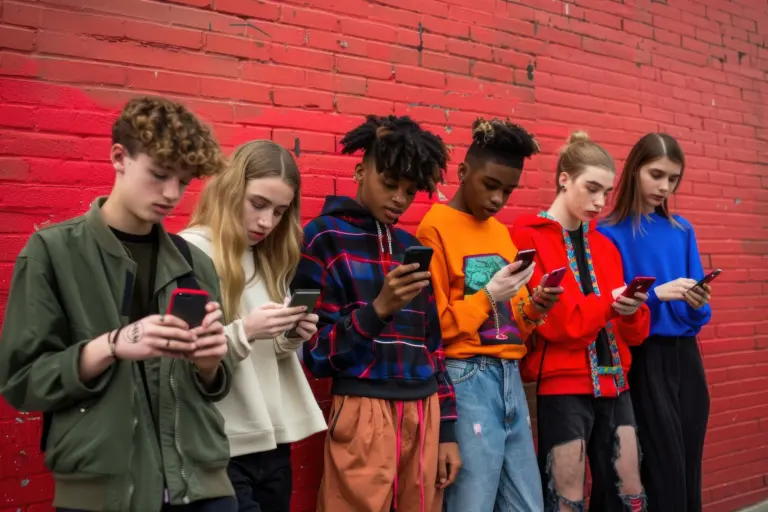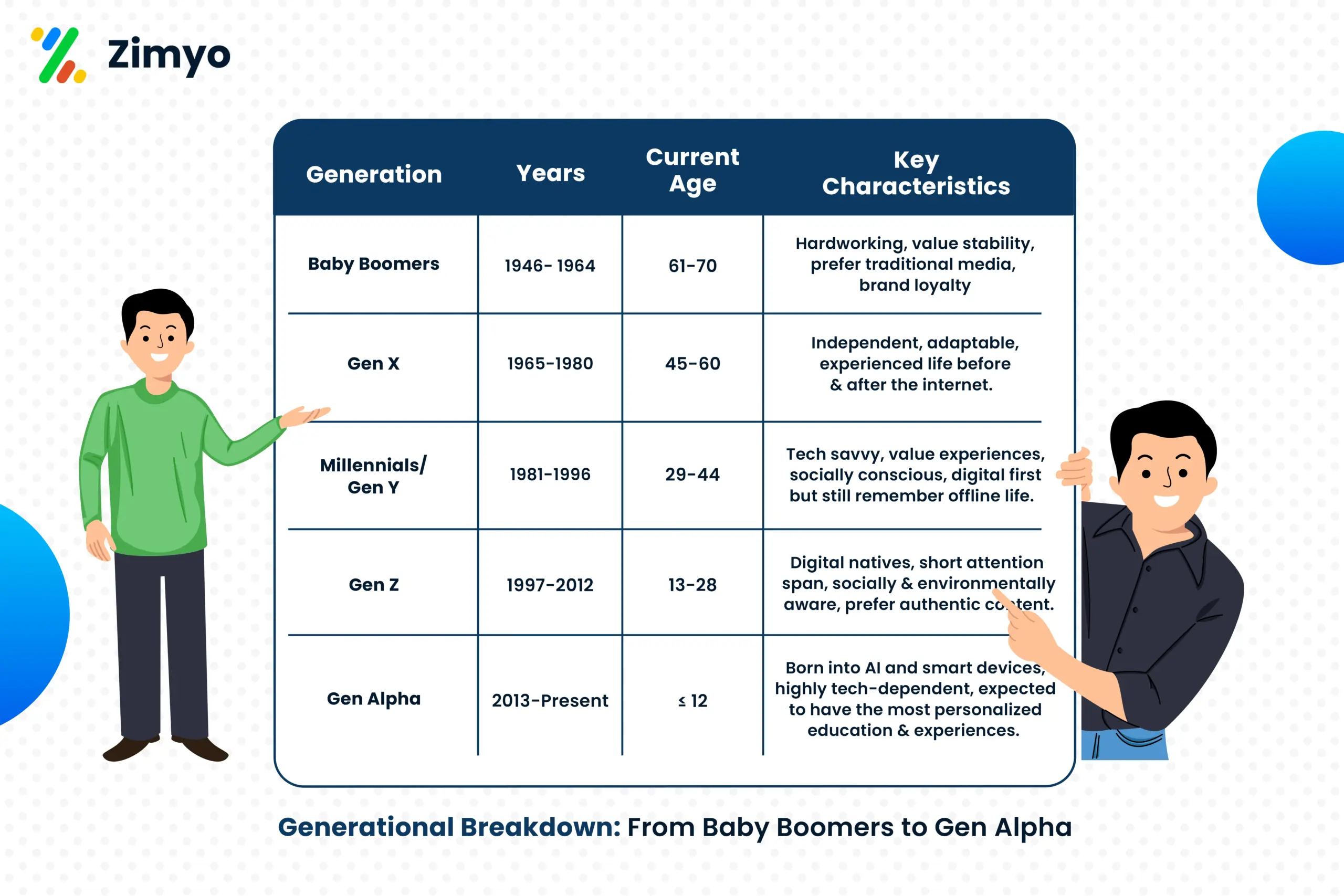Who is Gen Z, and why is everyone talking about them? Born between 1997 and 2012, this generation is unlike any before. They are digital natives, social media trendsetters, and the most diverse and open-minded generation yet. As they step into adulthood, their influence on culture, business, and technology is undeniable and quite controversial among the older generation of people.
In this blog, we’ll dive deep into the Generation Z age group, their unique characteristics, how they differ from Millennials, their sweet and sour rivalry. And why brands, employers, and society need to understand them better.
Gen Z Meaning and Years
The term Gen Z (short for Generation Z) also called “Zoomers” refers to individuals born between 1997 and 2012 (though some definitions slightly vary). This makes them the generation following Millennials (1981-1996) and preceding Generation Alpha (2013 onwards).
While Millennials experienced the rise of the internet, Generation Z was born into it. From a young age, they had access to smartphones, social media, and instant information, making them the most tech-savvy generation.

Gen Z and Technology
One of the most defining characteristics of Generation Z is their relationship with technology. Unlike previous generations, they don’t remember a world without smartphones and social media. This makes them:
- Fast learners who adapt quickly to new apps and trends.
- Shorter attention spans but better at multitasking.
- Visual-first communicators, preferring emojis, GIFs, and short-form videos over long texts.
A study by Pew Research Center found that 95% of Gen Z owns a smartphone, and over 55% spend more than five hours daily on their devices. Their ability to consume and process digital content rapidly sets them apart from older generations.
Social Media Habits
Unlike Millennials, who grew up with Facebook and Instagram, Gen Z prefers platforms like TikTok, Snapchat, and BeReal. They favor authentic, unfiltered content over polished posts and are quick to call out brands that feel “fake” or inauthentic.
According to Global Web Index, Gen Z spends an average of 8+ hours per day consuming online content, making social media the most influential space for marketing and engagement.









Work & Career Preferences
Gen Z’s Approach to Work
- They value flexibility—remote work and freelancing appeal to them.
- Unlike Millennials, who chase passion, Gen Z prioritizes financial stability.
- They prefer entrepreneurship, side hustles, and personal branding.
The Shift in Workplace Culture
While Millennials were known for ‘hustle culture’, Gen Z is more focused on mental health and work-life balance. They are more likely to set boundaries and expect employers to respect their well-being. They have a less tolerance for negativity and are more likely to leave a job for their disrupted metal health, emphasizing deeply on healthier work culture
Consumer Behavior: How Gen Z Shops Differently
What Influences Their Buying Decisions?
- Authenticity: They can spot fake marketing easily.
- Sustainability: They prefer eco-friendly brands.
- Online Reviews & Social Media: Generation Z trusts influencers over traditional ads.
- Fast & Convenient Shopping: They love online shopping but expect quick delivery and seamless experiences.
Mental Health Awareness
Unlike previous generations, Gen Z openly talks about mental health. Growing up in the digital age, they face increased pressure from social media but also benefit from greater awareness and access to mental health resources. Many prioritize therapy, self-care, and mindfulness.
According to APA (American Psychological Association), Gen Z reports higher levels of stress and anxietythan any other generation, with over 90% acknowledging mental health as a critical issue. They are also more proactive in seeking therapy and mental health support.
Gen Z and Social Activism
This generation is deeply engaged in social issues like:
- Climate change (Fridays for Future, Greta Thunberg)
- LGBTQ+ rights and inclusivity
- Mental health awareness
- Diversity and racial equality
They use social media platforms to raise awareness, organize movements, and hold brands accountable. A study by Edelman Trust Barometer revealed that 77% of Gen Z actively boycotts brands that don’t align with their social or environmental values.
Challenges Faced by Gen Z
Despite their strengths and fierceness this generation faces unique challenges. Some of which are:
- Economic uncertainty: High inflation, student debt, and job market struggles.
- Mental health pressures: Social media can contribute to anxiety and comparison.
- Social disconnection: Despite being hyper-connected online, they report feeling lonelier.
A Bank of America study predicts that Gen Z is expected to be the most financially challenged generation, facing high student loan debt and housing affordability issues.
Generational Breakdown: From Baby Boomers to Gen Alpha

Generational Breakdown: From Baby Boomers to Gen Alpha
Understanding different generations helps us see how society, work, and technology have evolved over time. Here’s a comparison of the generations from Baby Boomers to Gen Alpha:
Generation | Years | Curent Age | Key Characteristics |
1946-1964 | 61 – 70
| Hardworking, value stability, prefer traditional media, brand loyal. | |
1965-1980 | 45 – 60
| Independent, adaptable, experienced life before and after the internet. | |
1981-1996 | 29 – 44
| Tech-savvy, value experiences, socially conscious, digital-first but still remember offline life. | |
Gen Z | 1997-2012 | 13 – 28
| Digital natives, short attention spans, socially and environmentally aware, prefer authentic content. |
Gen Alpha | 2013-Present | ≤ 12 | Born into AI and smart devices, highly tech-dependent, expected to have the most personalized education and experiences. |
The Rivalry Between Millennials & Gen Z
While both generations share progressive values, their differences have fueled an online rivalry:
1. Social Media Wars
- Millennials dominated platforms like Facebook and Instagram, while Gen Z calls these “cringe” and prefers TikTok and Snapchat.
- Gen Z mocks Millennials for their “weird side-parts and skinny jeans,” while Millennials argue Gen Z’s “baggy jeans and middle parts” are just recycled 90s trends.
2. Work Ethic & Hustle Culture
- Millennials popularized hustle culture (long work hours, start-up dreams).
- Gen Z is anti-burnout, prioritizing mental health, work-life balance, and remote work flexibility.
3. Slang & Pop Culture Feuds
- Millennials created internet slang like “adulting” and phrases like “doggo” and “I can’t even.”
- Gen Z finds them outdated and prefers terms like “rizz,” “cap/no cap,” and “vibe check.”
- Gen Z mocks Millennial music choices (One Direction, Taylor Swift’s early albums) while Millennials roll their eyes at Gen Z’s obsession with TikTok remixes.
4. Economic Mindset
- Millennials were the “YOLO” (You Only Live Once) generation, spending on travel and experiences.
- Gen Z, having grown up during economic uncertainty, is more frugal, prefers investing, side hustles, and financial independence.
Conclusion: The Future of Gen Z
Gen Z is reshaping the world—from technology and work culture to activism and consumer behavior. Unlike Millennials, they are pragmatic, tech-savvy, and socially conscious. As they enter the workforce and gain more spending power, brands, employers, and society must adapt to their unique needs and expectations.
Whether you’re a marketer, employer, or just curious about this new generation, understanding Gen Z is key to staying ahead in today’s rapidly changing world.
FAQs (Frequently Asked Questions)
What does Gen Z stand for?
Gen Z stands for Generation Z, referring to people born approximately between 1997 and 2012. They are known for being digital natives, socially conscious, and tech-savvy.
Why is Gen Z famous?
Gen Z is famous for being digital natives, social activism, entrepreneurial mindset, and trendsetting influence in fashion, technology, and entertainment. Their impact on work culture, consumer behavior, and social movements makes them a defining generation of the modern era.
Gen Z characteristics
Gen Z is tech-savvy, socially conscious, and entrepreneurial, with a preference for authenticity, financial independence, and work-life balance. They have a short attention span, value experiences over possessions, and embrace diversity, mental health awareness, and global trends.












